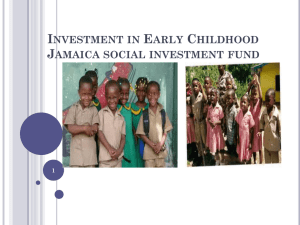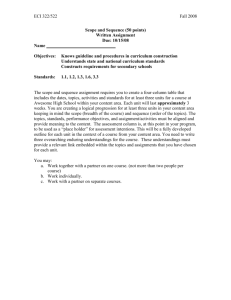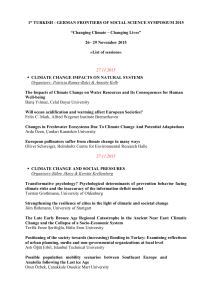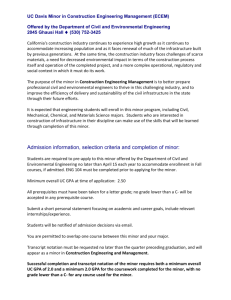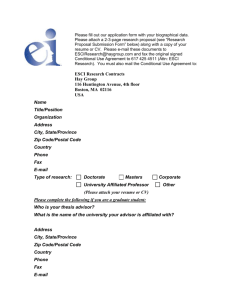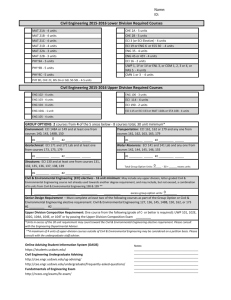ECI
advertisement
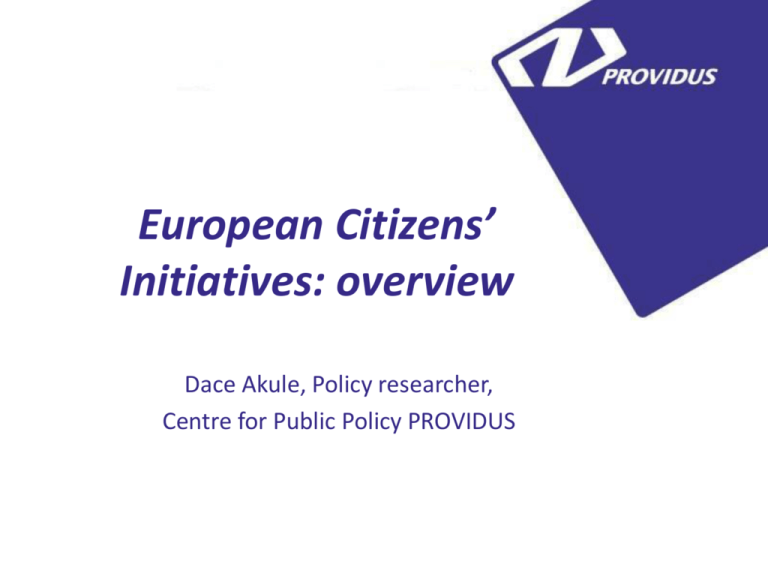
5 European Citizens’ Initiatives: overview Dace Akule, Policy researcher, Centre for Public Policy PROVIDUS What is European Citizens’ Initiative? First tool of direct trans-national democracy allowing 1 million EU citizens to propose EU legislation in specific fields. • Lisbon treaty Article 11 (December 2009) and Regulation (April 2012) • Organizers – citizens’ committee consisting of at least 7 EU citizens-residents of 7 different EU member states – send their initiative to the Commission explaining its objective and purpose, providing information about organizers • Commission has 2 months to evaluate, if treaties give the Commission the right to submit a proposal for EU legislation in this area; whether the initiative is not “manifestly abusive, frivolous or vexatious and manifestly contrary to EU’s values” • If the initiative passes this test, it is registered, and the collection of citizens’ signatures can start. Organizers have 12 months to collect at least 1 million signatures from at least 7 EU member states • If the initiative does not pass this test, the organizers receive an explanation from the Commission about the reasons for refusal, as well as information on the ways to appeal this decision What is European Citizens’ Initiative? • Signatories are EU citizens eligible to participate in European Parliament elections (18 years in Latvia, 16 years in Austria) • The collection of signatures can take place in paper format and online • Responsible national institutions have 3 months to verify the statements of support to check if these persons are EU citizens and are eligible, issuing certificates on the number of supporters from the respective member state • Commission has 3 months to examine the initiative in more detail by inviting organizers to a meeting and – together with the European Parliament – organizing a public hearing on the initiative • In total, after 20 months since initiators wrote to the Commission, it has to decide whether to submit the initiative in a form of a legislative proposal of amendments to existing EU legislation • If no, the Commission has to explain the legal and political reasons • If yes, the normal EU legislative process starts – impact assessment, public consultation with stakeholders, discussions with European Parliament (EU voters’ interests) and Council of Ministers (member states’ national interests)) First attempted and successful ECIs • This tool became available in most member states in April 2012 (in Latvia the national legislation was amended in October 2012) • 14 initiatives are registered and collection of signatures is ongoing • 7 initiatives were refused registration, with Commissions’ explanations on the reasons for refusal • 1 initiative was withdrawn by the organizers ECI: Fraternity 2020 - Mobility. Progress. Europe. Enhancing EU exchange programs like Erasmus or the European Voluntary Service in order to contribute to a united Europe based on solidarity among citizens. More funds and effective use of funds for exchange programs, increased efforts to develop intercultural skills of participants (language classes and classes about the host country' s traditions, history, etc), better monitoring of progress via statistical tools of Eurostat and Eurobarometer. http://www.fraternite2020.eu/ ECI: Single communication tariff act Introducing one unique all-inclusive, monthly flat-rate communication tariff within the boundaries of the EU, thus ending roaming charges across Europe to complete the European common market for all mobile phone customers. https://twitter.com/onesingletariff ECI: Right to water Implementing the human right to water and sanitation and promoting the provision of water and sanitation as essential public services for all. EU should increase its efforts to achieve universal access to water and sanitation, with EU legislation requiring governments to ensure and provide all citizens with sufficient and clean drinking water and sanitation, and excluding liberalization of water supply and management of water resources. http://www.right2water.eu/ ECI: One of us Banning and ending the financing of activities which presuppose the destruction of human embryos, in particular in the areas of research, development aid and public health. http://www.mpv.org/oneofus/one_of_us/00015079_ONE_OF_US.html ECI: Let me vote Strengthening the right of EU citizens residing in another member state to vote in all political elections in their country of residence on the same conditions as the nationals of that state, thus enhancing the concept of European Citizenship, facilitating the freedom of movement within the EU and remedying the loss of voting rights presently experience by a significant number of EU citizens who are long-term residents of other member states. ECI: Stop vivisection Cancel existing legislation (directive 2010/63/EU) and proposing new EU legislation aimed at phasing out animal experiments due to ethnical objections and scientific principles that invalidate the " animal mode" for predicting human response. Introducing a compulsory use of data directly relevant for the human species in biomedical and toxicological research. http://www.stopvivisection.eu/ ECI: High quality education for all Establishing a multi-stakeholder discussion or collaboration platform where parents, teachers, students, social partners, educators and decision-makers will propose, debate and formulate a European policy for a quality, pluralistic and EU 2020-oriented education model at primary and secondary level for all Europeans. Establishing a roadmap to implement the model, possibly culminating in a European Baccalaureate. http://www.EuroEdTrust.eu/ ECI: For a responsible management of waste, against incineration Introducing a legislation requiring a responsible management of waste in all the EU based on 7 principles: increased sorting of waste, banning over-packing, obliging the use of recyclable packaging, banning the burning of waste, obligation to introduce technologies for waste management without negative effects on environment and health. http://ice.id.st/ ECI: Suspension of the EU climate and energy package Suspending the 2009 EU climate and energy package (excluding energy efficiency clauses) and further climate regulation until a climate agreement is signed by major CO2 emitters - China, USA, and India. Stopping EU climate policy wasting resources on ineffective unilateral action at a time of economic crisis. Stopping carbon leakage - export of jobs and businesses to developing countries without climate legislation. Making fuel and energy cheaper, increasing employment and reducing fuel poverty. Increasing energy security by allowing member states to use their own natural energy resources. ECI: End ecocide in Europe: a citizens' initiative to give the Earth rights Adopting legislation to prohibit, prevent and pre-empt Ecocide, the extensive damage, destruction or loss of ecosystems by criminalizing ecocide (responsibility of both natural and legal persons), prohibiting and preventing ecocide on European territories and maritime territories falling under EU legislation, under the responsibility of EU registered legal persons or EU nationals. ECI: European Initiative for Media Pluralism Protecting media pluralism through partial harmonization of national rules on media ownership and transparency, conflicts of interest with political office and independence of media supervisory bodies. Amending Audiovisual Media Services Directive aiming at introducing harmonized rules with regard to the protection of media pluralism as necessary step towards the correct functioning of the internal market, meeting the public interest objective of maintaining a pluralist democratic debate through free exchange of ideas and information in the EU. http://www.mediainitiative.eu/ ECI: Central public online collection platform for the European Citizen Initiative Enabling all European citizens to participate in the European politics by providing an Online European Initiatives Platform for the registration of new initiatives and the collection of signatures, showing an overview of all initiatives, allowing initiators to get in touch with supporters to discuss and argue new ideas, and showing at what state each of the initiative is, who is in charge of the next step until a final decision is made. ECI: 30km/h - making the streets liveable! Introducing a 30km/h EU wide default speed limit for urban/ residential areas, with local authorities having the right to set other speed limits if they can show how environmental and safety needs of the most vulnerable road users are met. Lower speed limit would reduce injuries and fatalities, noise, air pollution and CO2 emissions, and improve the traffic flow. People will be able to travel with less fear, environmentally friendlier modes of transport will become more attractive. http://en.30kmh.eu/register-now/ ECI: Canceling free movement of persons principle with Switzerland Terminating the agreement between the Swiss Confederation and the EU on free movement of persons due to breach of contract by the Swiss Confederation and the Member States as well as for lack of jurisdiction to ensure legal protection for EU citizens or companies. Switzerland should not be allowed to participate in EU single market as it treats EU citizens from Eastern Europe as 'second class' citizens. http://www.swissout.eu/eng.html Refused initiative: My voice against nuclear power Phasing out nuclear power plants in the EU and developing renewable energy sources to substitute nuclear material and fossil fuel use (Austria). Commission explains that ECIs can not address Euratom treaty; the Commission has no right to modify or repeal treaties (this is the right of member states). Moreover, the goal of Euratom Treaty is to develop nuclear industries, thus the initiative is “manifestly contrary to the objectives of this treaty". The organizers are currently examining with the Commission whether the initiative could be readmitted with amendments. Refused initiative: Singing the European Anthem in Esperanto Commission explains that the Commission has no right to propose a legislation on this issue as treaty includes an overall objective to contribute to the flowering of the cultures of member states. "Up to the present, it would appear that no Member state has made the promotion of Esperanto part of its cultural heritage policies nor can it be considered to be part of a common cultural heritage". Refused initiative: EU citizenship after secession Citizen participation in decision-making on the collective sovereignty - to ensure that citizens of a new state resulting from the secession of a part of an EU member state still remain EU citizens (Spain). Commission explains that in such cases solutions are negotiated within the international legal system, and there is no legal basis for EU legislation to address consequences of secession of a part of a member state. Refused initiative: Abolition of bullfighting Abolition of bullfighting in Europe and the use of bulls in celebrations of cruelty and torture for fun (Spain). Commission cites a verdict by the Court of Justice saying that animal welfare is not part of the objectives of EU treaties, thus not providing legal basis for EU legislation in this area. Refused initiative: European public bank Creation of a European public bank focusing on social and ecological issues, and solidarity (France) - allowing member states to borrow funds at low interest rates. Commission explains that there is no legal base for EU legislation to address this initiative. Refused initiatives: Solidarity, basic income • One million signatures for "A Europe of solidarity" (Greece), crisis-related. • Unconditional Basic Income to improve the working environment to protect workers health and safety, and end inequality between men and women with regard to labor market opportunities and treatment at work (Germany). Commission explains that this area is excluded from harmonization of rights and regulations of member states, only exchange of information and learning. Withdrawn ECI: Dairy Cow Welfare Improving the welfare of 23 million dairy cows in the EU by guaranteeing a minimum standard to enable improvements as seen with legislation for pigs and poultry. The legislation should be based on EU welfare quality principles - good housing, good health, good feeding and appropriate behavior. The organizers withdrew the initiative due to problems with ECI in practice (no free software to start the online collection of signatures, data protection issues for the paper statements of support), planning to resubmit the initiative once ECI is a more effective mechanism, allowing to collect 1 million signatures safely or at reasonable costs for organizers. First lessons: technical problems Although the Commission provides free open-source software to create systems for the online collection of signatures, organizers were not able to start the process because they could not find a host provider. This was solved by allowing first initiatives to host their systems on the servers of the Commission and helping organizers to get their systems certified by the responsible institution in Luxembourg . 11 organizers have agreed with this solution, with initiative Fraternite2020 already having started since October the collection of signatures online due to this support. Initiative Right to Water managed to find a private host, collecting signatures online since September. As this delayed the process, the Commission has announced that it will give all registered initiatives time until November 2013 to collect signatures. In addition, ECI focuses on further support for ECIs. Idea to create a website where ECIs can be piloted and tested in advance. First lessons: technical problems The first two best prepared, funded and professionally conducted ECIs have collected approximately 50,000 signatures (5% of the needed amount). Adequacy of the support for ECI organizers? Use of internet and the sophistication of online services. Proposal to establish a European citizenship card allowing citizens to sign ECIs online reassured that their personal data is protected. Use of internet banking, e-signatures not popular. Regulation on ECI to be reconsidered in 2015. First lessons: knowing EU treaties We live, we learn about EU competencies, EU treaties, EU decisionmaking. The sky is the limit to our creativity, but ECI is based on EU treaties Commission's right to propose legislation in areas of EU competence. No changing of existing treaties (one seat for European Parliament, stopping of accession negotiations with Turkey), no initiatives in areas outside of EU competence (pensions) or areas where the Commission does not have the right to propose legislation (foreign and security policy). Very good that the Commission looks not only at the legal basis (treaty articles) that organizers have quoted as allegedly appropriate, but also other legal basis that it could imagine as addressing the respective initiative. First lessons: communication Pan-European dimension of the issue that allows EU citizens to identify with, and readiness to work in a transnational environment. In the worst case the initiative is only available in one language, and there is no website (yet) or the website is translated with Google translate. In the best case 22 languages, with very informative and user-friendly (attractive) website. Some organizers publish their private (gmail, hotmail, yahoo) e-mails, others have dedicated e-mail domains (e.g. mediainitative.eu) Majority of ECIs don't include a draft legal act for potential submission to the Commission, only an explanation about the idea First lessons: funding and strategy Funds acknowledged (on ECI website) for one initiative start from 0 Euro to 150,000 Euro. According to ECAS, each signature requires approximately 1 Euro, so 1 million signatures = 1 million Euro. Question of transnational giving and tax relief schemes to encourage fund raising. Readiness of organizers to work from Day 1 or hope for a miracle in 12 months? "Organizers seems to have been taken by surprise and had neither the necessary knowledge, funding or strategy in place when the signature gathering clock started to tick," Bruno Kaufmann Bottom-up citizens' initiatives vs. 'professional' citizens' initiatives (lobbies, well-established associations)? Developing of new civil society among trans-nationally networked individuals and without structures ad budgets. Citizen as a rightful agenda-setter. Resources "European Citizens' Initiatives - a first assessment", ECAS, Euronews development, November 2012 "ECI 1.01. Training Camp Report. Brief assessment of the first seven months of the emerging European Citizens' Initiative practice", Bruno Kauffmann, November 2012 Commission website http://ec.europa.eu/citizens-initiative/public/welcome ECI campaign website http://www.citizens-initiative.eu/ Thank you!
